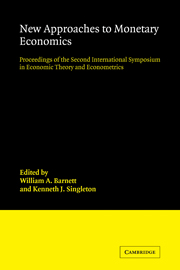 New Approaches to Monetary Economics
New Approaches to Monetary Economics Book contents
- Frontmatter
- Contents
- Editors' introduction
- List of contributors
- Part I Transactions motivated monetary holdings in general equilibrium
- Part II Financial intermediation
- Part III Monetary aggregation theory
- Part IV Issues on aggregate fluctuations
- Part V Theoretical issues in the foundations of monetary economics and macroeconomics
- 15 Pricing and the distribution of money holdings in a search economy, II
- 16 The optimal inflation rate in an overlapping-generations economy with land
- 17 Some unsolved problems for monetary theory
18 - Externalities associated with nominal price and wage rigidities
Published online by Cambridge University Press: 04 August 2010
- Frontmatter
- Contents
- Editors' introduction
- List of contributors
- Part I Transactions motivated monetary holdings in general equilibrium
- Part II Financial intermediation
- Part III Monetary aggregation theory
- Part IV Issues on aggregate fluctuations
- Part V Theoretical issues in the foundations of monetary economics and macroeconomics
- 15 Pricing and the distribution of money holdings in a search economy, II
- 16 The optimal inflation rate in an overlapping-generations economy with land
- 17 Some unsolved problems for monetary theory
Summary
Arguments in favor of economic policy intervention are usually based on the existence of externalities. This mode of argument, long a tradition in microeconomics, is relatively new to macroeconomics. In the 1960s, for example, when Milton Friedman outlined in Capitalism and Freedom the pros and cons of government policy in many areas of economics, he centered his discussion around the existence of externalities in every area except macroeconomics.
Ever since the start of research on the microfoundations of macroeconomics in the early 1970s, many studies have attempted to correct this omission by casting proposals for macroeconomic policy in an externality framework. The vast majority of these studies has been concerned with externalities that relate to whether the natural or average rate of employment is inefficient. Few have been concerned with whether the observed fluctuations in employment around the natural rate are inefficient. In his 1972 book Inflation Policy and Unemployment Theory, Edmund Phelps summarized over a dozen externalities, all suggesting that the natural rate of employment is inefficient and higher than the optimum level of unemployment. Phelps mentioned externalities due to imperfect competition, information spillovers about conditions in the labor market from employed to unemployed workers, overpricing of labor due to lemon problems, failure to incorporate the value of self-respect from a good job, external effects of on-the-job training and experience, and income taxes that discriminate in favor of leisure.
- Type
- Chapter
- Information
- New Approaches to Monetary EconomicsProceedings of the Second International Symposium in Economic Theory and Econometrics, pp. 350 - 367Publisher: Cambridge University PressPrint publication year: 1987
- 5
- Cited by


